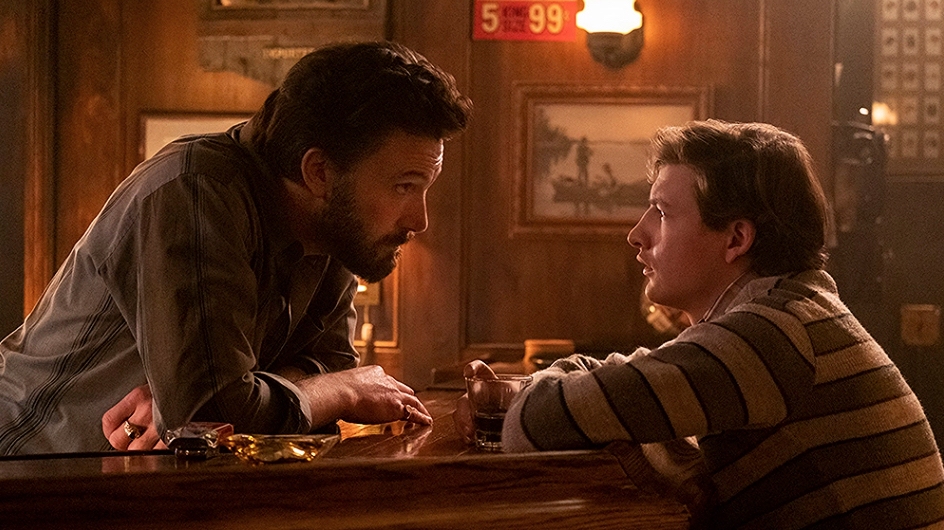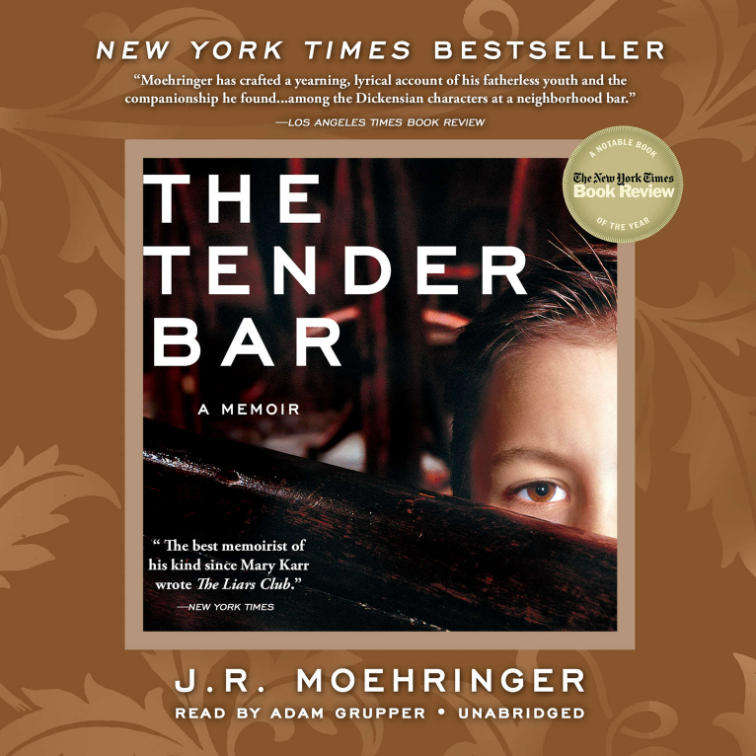I was left with mixed feelings after catching George Clooney‘s The Tender Bar last weekend. Set in Manhasset and Connecticut in the ’70s and ’80s and featuring a steady, trustworthy performance from Tye Sheridan and an amiable supporting one from Ben Affleck, this is a warmish, working-class family saga about the usual dysfunctions and obstacles…in this case a fatherless kid nurtured in a bar + romantic college-age yearnings + toil and trouble + struggling to make it as a journalist.
The following day I ordered a copy of J.R. Moehringer‘s same-titled life saga, published in 2006 and the basis of William Monahan‘s screenplay.
Moehringer is a relaxed, colloquial, straight-up honest writer. The book is well sculpted, easy to read, no speedbumps or detours. It’s a compelling tale of a Manhasset kid who grew up fatherless (his radio talk-show dad was an absentee alcoholic asshat) but who was nurtured along by some surrogate dads at a Manhasset watering hole called The Dickens (later Publicans), and eventually went on to a Yale education and a career as a journalist with the N.Y. Times, Rocky Mountain News and L.A Times.

The film is not as good as the book, but it’s an agreeable, sometimes affecting in-and-outer. It keeps everything personal and local, and is basically a “this happens and that happens and then this happens” type of thing. I wasn’t levitated, but I wasn’t annoyed either. I went with it and so did Tatiana, who insists that Clooney’s film will affect people in the same way that Kenneth Branagh‘s Belfast, another turbulent family drama, did during Telluride.
Actually I was a bit irked from time to time.
Affleck charms as Uncle Charlie (no allusions to Joseph Cotten‘s doppleganger in Hitchcock’s Shadow of a Doubt), and despite playing this amiable bartender with a somewhat broad “Long Island accent,” which struck me as needless. Ben is an authentic Boston guy, and he doesn’t need to pretend. On top of which all Charlie does is hang out and share pearls of working-class wisdom. Nothing develops or builds with the guy.
There’s a father-son event at young J.R.’s school, and you naturally expect that Charlie will fill in for the absent asshat dad (Max Martini). Affleck stepping up to this plate would have meant something to us. But no — J.R.’s crabby, white-haired grandfather (Chris Lloyd) puts on a tie and attends instead. Which struck me as hugely unsatisfying.
And there’s a cancer scare subplot involving J.R.s mom (Lily Rabe) that goes nowhere. One minute Affleck is admonishing a young woman for even asking about Lily’s disease, and a scene or two later she’s older and cancer-free and completely out of the woods. And it’s like “whut?”
And I regret to say (and I hate having to spit this out, being an ardent admirer of Clooney, one of the better human beings in this town) that The Tender Bar is partly undone by a surreal casting decision that makes the first 40% of the film feel seriously out of whack.
I’m speaking of the casting of young Daniel Ranieri, a kid from an apparently Middle Eastern family (the last name is Italian but the lineage appears to be Lebanese, Iranian, Jordanian…somewhere in that realm), as the 10 year-old version of Sheridan, who, like Moehringer in actuality, is the biological son of a German paleface couple (Rabe and Martini). It would be one thing if Ranieri was adopted, but there’s NO WAY IN HELL this kid grows up to be Tye Sheridan.
And then The Tender Bar doubles down by changing the identity of a wealthy Westport white girl named Sydney, whom Moehringer fell in love with during his time at Yale and who represents the unattainable ideal for a working-class kid from Manhasset…Clooney has changed Sydney from a blonde, Daisy Buchanan-like character with a small nose, ample breasts and whiter-than-white parents (her father is described by Moehringer as Hemingway-esque) into a beautiful woman of color (Briana Middleton) and her parents into an interracial couple (mom is played by Quincy Tyler Bernstine).
The first word that came to mind was “again?”
This is yet another example of virtue-signaling, inclusion-mandate casting, and particularly Clooney and producers Grant Heslov and Ted Hope wanting to groove along with the ethos of progressive woke Hollywood.
I grew up in Wilton and Westport, and I personally knew of one couple of color (opera singer Betty Jones, a friend of my mom’s, and her husband) and heard about no interracial couples at all. That’s not to say there were none, but if they existed in the Wilton-Westport-Weston region they were very under-the-radar.

For a working-class Manhasset kid to fall head over heels in love with a rich, blonde, unattainable goddess from Westport…that works, that fits, I’ll buy that. But Tender Bar’s version of Sydney and her parents is insincere presentism — it has no reality current, certainly in a 35 year-old context.
And frankly? People from scruffy working-class towns like Manhasset weren’t exactly known for being racially progressive or attuned to color-blind attitudes. This is the ‘70s and 80s we’re talking about. Those boozy guys in The Dickens would have definitely raised an eyebrow if Sheridan’s J.R. character had shared the particulars about his Yale dream lover. They wouldn’t have “said” anything, but they would have definitely, you know, cleared their throats.
I really wish that the unpretentious, matter-of-fact tone of Moehringer’s book has been more fully conveyed in Monahan’s screenplay.
There’s a 12-page epilogue (pages 357 to 368) about Moehringer’s trip back to Manhasset in the immediate wake of the 9/11 attacks. Nearly 50 Manhasset residents were killed that day, including an uncle-like bartender and a cousin. It was a really smart decision by Clooney, Monahan and Heslov to leave this part out.
Thanks again to Sunshine Sachs for inviting Tatiana and I to the screening and the after-party, which included a nice Jackson Browne moment. A nice vibe and a wonderful night. Thanks all around.
I wanted to soft-pedal and alpha-vibe and offer my best imitation of Clayton Davis as much as possible in this review. Because I want to be a good-vibe columnist, and because Tatiana wants me to be good, friendly and obliging because she loves going to super-cool DGA screenings and wonderful parties with heavenly food and three-song sets by Jackson Browne.
As I told a Sunshine Sachs publicist, my main enthusiasm was for Sheridan’s performance, and to a lesser extent Affleck’s. Ben is “charming” in an agreeable, earthy, booze-addled way, and I suppose this will translate into a Best Supporting Actor nod. Maybe. But he won’t win because (a) Uncle Charlie doesn’t do anything of substance — he’s just a laid-back guy dispensing philosophical hors d’oeuvres, and because (b) the movie is middling. I’m sorry — I wish it were better.
